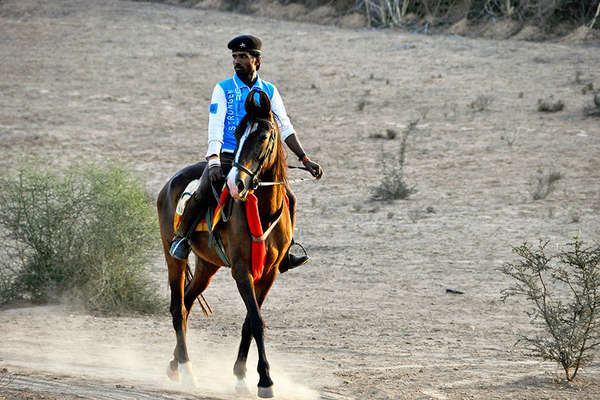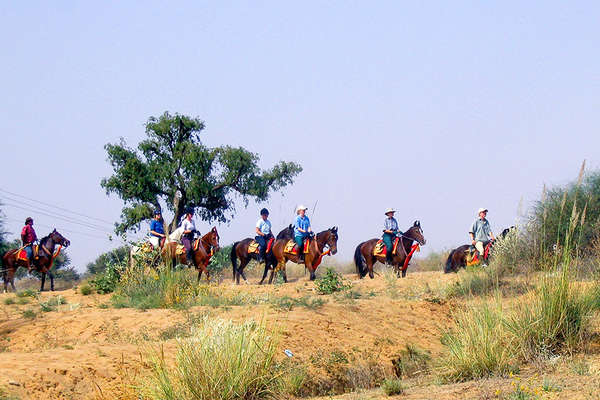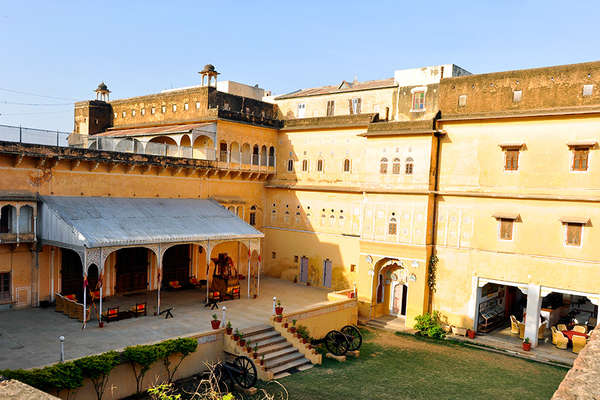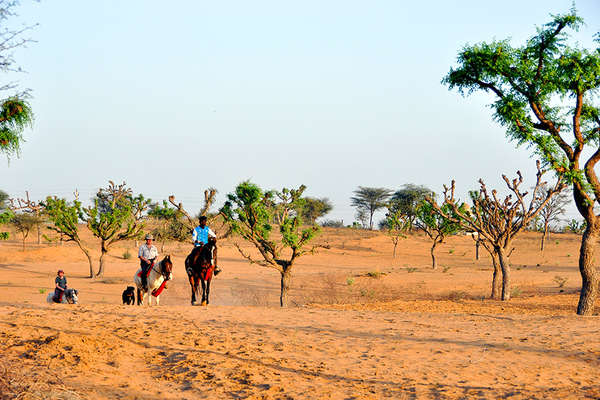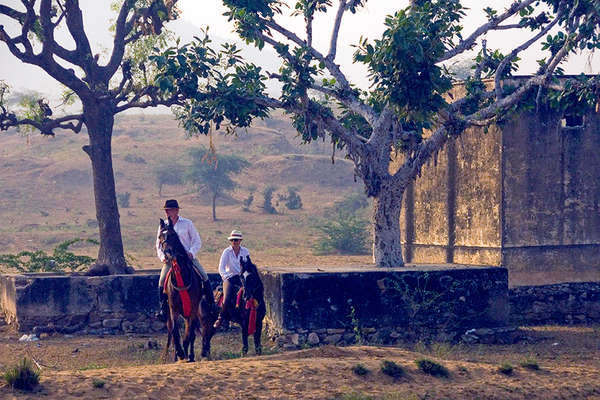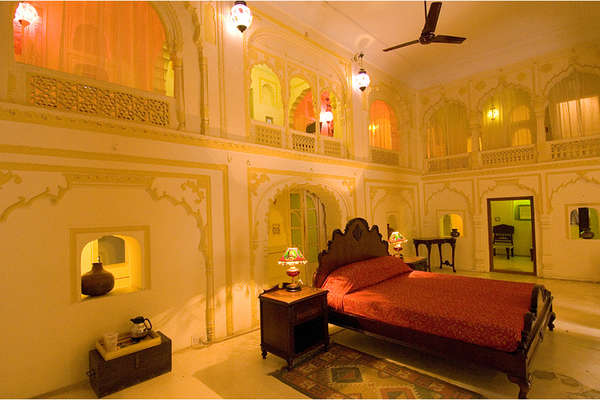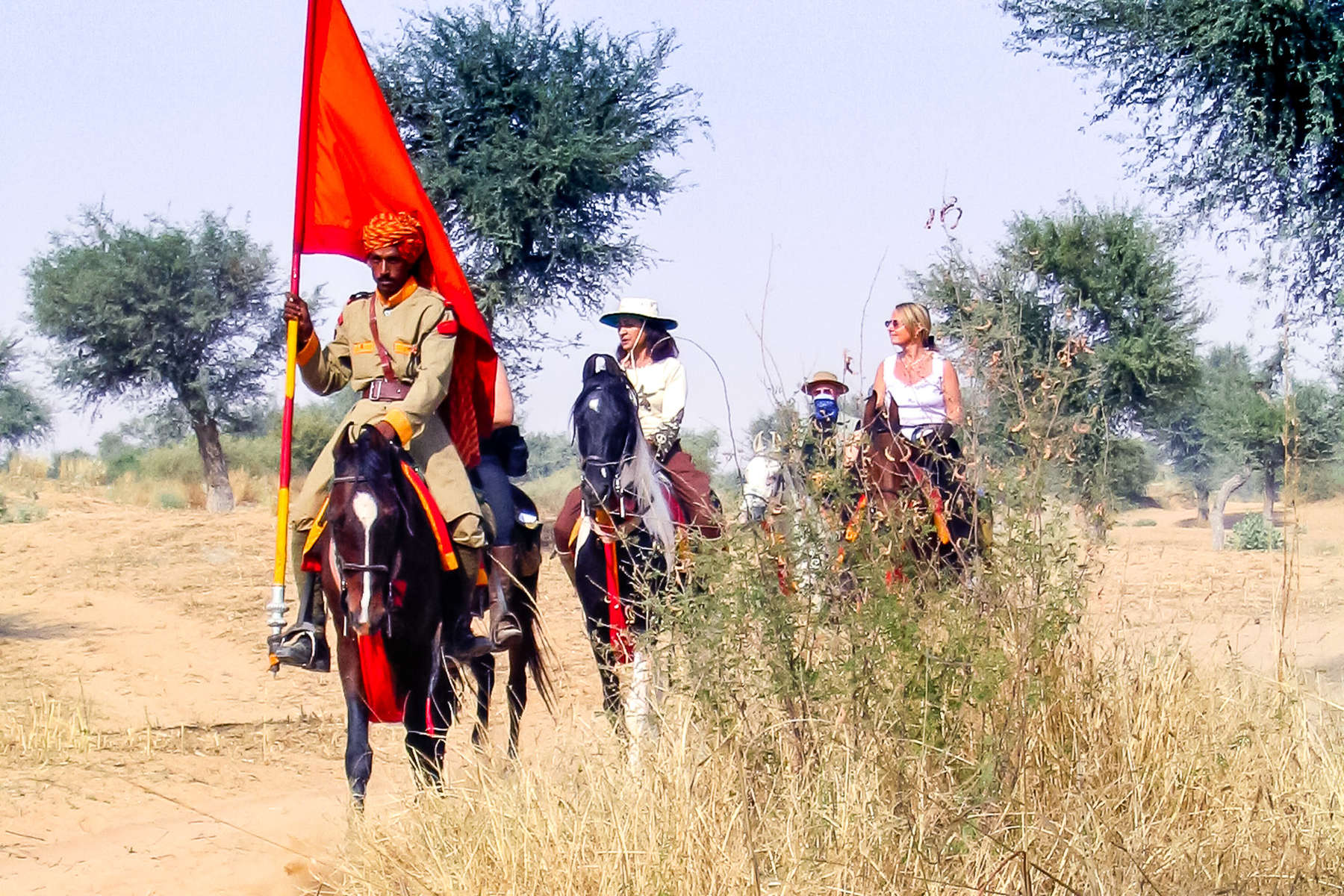
From the horse’s mouth
Itinerary
Highlights
- Stay at Dundlod Fort, the ancestoral home of your guide Bonnie Singh who is the heir of a large rajput family
- Enjoy the extravagent royal and colonial feel staying at palaces and strongholds, frozen in time
- Experience true rural Indian life riding through small villages on horseback
- Ride through rich and varied landscapes with a wide range of bird life
- Arrive on horseback into the villages of salesman and the strongholds of maharajas
- Stay at Dundlod Fort, Vivanna Heritage Haveli, Malji Ka Kamra and Alsisar Fort, capturing the legends of the past.
- Visit the pink city of Jaipur and the stronghold of Amber Fort
Dates & prices
Price details
- Groups are composed of a minimum of 8 riders and a maximum of 14 international riders.
- Rates are per person, based on two riders sharing a twin or double room.
- To guarantee your own room there is a single supplement of $1220 / £930 / €1060. If you sign up to the ride as a solo rider and you are willing to share, but there are no other riders likely to share your room, you will be charged 50% of the single supplement. This will be waived once a sharer is found.
- Airport transfers are included to and from Delhi.
- Non-riders are welcome and a special jeep itinerary can be arranged. Please contact us for more information.
- A visa is required to enter India and is your responsibility.
Please Note
The itinerary may be modified at anytime for security reasons, meteorological or events beyond our control such as blocked roads, rivers in flood, drought, strikes and local holidays. Equus Journeys, our local partners and their local guides will always strive to find the best solution and will alter the itinerary as needed.
The names of the hotels and accommodation are given for information only and depending on availability, they may be modified without notice and replaced by another of a similar standard.
Price includes
Support Team
1 horse equipped with saddle and bridle per rider
1 team in charge of the horses
Inland transports
All land transfers in an air-conditioned van
Accomodation
Double room in hotel or palace in the countryside with private bathroom
Meals
1 bottle of mineral water per day during the ride. Guests can purchase additional water if they wish.
Additional equipment
First aid kit
Extra
Price doesn't include
Meals
Beverages and personal extras
Transports
Visa fees
Extras
Camera fees, laundry or personal extras
Insurance
Optional
Accommodation
Equestrian info
Horses
Guide & local team
Minimum riding ability
Minimum riding ability
Weight limit: 14 stones (89 kgs) (196 lbs)
Pace
Tacking ability and participation
Trip conditions and Requested experience
Visiting a new country offers the opportunity to meet other cultures with different mentalities, therefore it is important to accept these differences and respect the local way of life.
Equestrian equipment
We recommend our riders to wear a helmet to the correct standard and you should bring your own to ensure a proper fit.
Travel info
Comfort
Nights in hotels: hotel nights will be in twin bedded rooms with a private bathroom. Hotels are of a high standard. They are often previous palaces converted into hotels, retaining much of their original charm.
Nights at camp: safari style camp with large spacious tents. Each tent has two made up beds with comfortable mattresses. Separate toilets and showers are set up, with hot water available in the morning and evening.
Enjoy sumptuous meals, carefully prepared, freshly cooked and delicately spiced.
Meals
Camping :A help yourself breakfast of toast and cereals with eggs cooked to order if you wish. You have a hot lunch and then another hot meal in the evening around the camp fire. The food is varied and tasty Indian cuisine.
Contrary to popular belief, all Hindus are not vegetarians and strict vegetarianism is limited to the south. However, you are unlikely to be served beef steak as the cow is sacred. You can expect to eat either goat or chicken.
Water:
Take care and do not drink water unless it out of a bottle. It is better to buy mineral water when staying in the towns. The water you will be offered along the trail will be treated.
There will be limited alcohol to purchase and a variety of soft drinks.
Climate
The rides are scheduled for the cooler months and at this time the maximum temperature would be around 24°C during the day. Please be mindful that evenings can be cool (c. 5°C) and you should bring a warm sweater and be prepared for a chilly morning just in case there is a snow fall in the Himalayas as the temperature does drop suddenly at times. When camping, the nights can be cold are felt much more and you are advised to bring warm clothes for sleeping.
Tips
After the ride, guest usually collect the money in an envelope and hand it over to either your guide Bonnie or Sunayana (his assistant) with the instructions to divide it among the whole team – grooms, camp cook and staff, jeep drivers etc… Budget for c. £40-50 per person in total.
At the hotels, tipping is absolutely discretionary. The bell boys at the hotel handling the baggage do expect a small tip. If you are happy with their services, they may give them around Rupees 50 to 100 – but again, it is absolutely discretionary.
Be careful not to tip too much - being overly generous can affect the general standard of living and destabilise the local economy. If children earn more money than their fathers by begging or asking for money for photos then this can create major distortions within the family.
Packing list
Head
- Equus Journeys strongly recommend that you wear a riding helmet and that you take your own to ensure a correct fit. There are many lightweight options available nowadays
- Sunhat for when not riding
- Sunglasses - with a cord attached so they don't fly off when riding
- Wooly hat
- Buff or Bandana to protect against sand, sun and dust
Upper body
- Long sleeved shirts provide protection from the sun and are an extra layer
- T-shirts
- Lightweight fleece or jumper
- A light waterproof jacket
Legs
- Lightweight, comfortable riding trousers or jodhpurs - we recommend riding in them at home before taking them on holiday to ensure they don't rub
- Casual trousers for the evenings.
- Swimsuit to enjoy the swimming pool of the hotels
Hands and Feet
- Comfortable riding boots. We recommend short boots with half chaps. We don't recommend taking your favourite long leather boots in case they get damaged
- Trainers or equivalent light shoes for the evenings
- Socks
- Gloves - your hands are particularly exposed to the sun
Our Recommendations
- Please don't take a hard sided suitcase. Your luggage should be soft sided with a capacity of about 80 litres. We recommend taking a backpack or similar.
- Backpacks cannot be worn whilst riding. MAX LOAD is 15kg.
- We recommend a small bumbag or a coat with pockets so that you can carry small items with you during the day (camera, sunscreen, lipbalm etc) and whilst riding.
- We recommend travelling in your riding boots and carrying your hat and some riding clothes in your hand luggage - then if your luggage goes astray you are still able to ride.
- Tall riders may benefit from taking a pair of long stirrup leathers with them (the local stirrups are adjustable but are sometimes limited in length)
Other useful items
- Towels - camping ones will both dry and pack more easily
- Small backpack 25-30 liters
- Camera and high capacity memory card. Spare battery
- Bumbag for carrying your camera and small items whilst riding
- Headtorch or small torch for moving around camp at night - bring spare batteries and bulbs
- Water bottle (2 litres or 2 x 1 litre)
- Swiss army knife
- Wet Wipes or equivalent (for when washing facilities aren't available)
- Toilet paper and a lighter to burn it with
- Small plastic bags for rubbish
- Ear plugs (for light sleepers)
In your hold luggage
- Any liquids, such as shampoo, moisturiser, deodorant unless they are less than 100ml and all bottles can fit in a small, clear, plastic ziplock bag. We recommend biodegradable washing products where possible.
- Swiss army knife (or equivalent)
In your hand luggage
- Any valuables, such as your camera, ipod, ipad etc.
- Travelling in your riding boots and carrying your hat and some riding clothes is highly recommended - then if your luggage goes astray you are still able to ride!
Medical kit
- Any medication you regularly take
- Sunscreen and lip balm - should be high factor
- Insect repellent, preferably containing deet
- Blister plasters in case of any rubs
- Antiseptic cream, plasters, aspirin, anti-histamine, insect-bite salve etc...
- Spare prescription glasses/contact lenses
- Eye drops
- Imodium or similar anti-diarrhoea medication
- Re-hydration sachets
- Water purification tablets
- Antiseptic wipes
- Handwash gel
Miscellaneous
- We recommend taking a copy of your passport and insurance documents with you in case you lose your originals
- Please take your rubbish home with you. There are no recycling facilities in Rajasthan, so take your used batteries, aerosols etc back home and dispose of them appropriately. Try to leave excess packaging material at home before travelling
- You may wish to take some photographs or postcards of your home with you to show your hosts. You may also wish to take some crayons, colouring books etc for the children
- If you prefer travelling in a "light way" please choose a biodegradable soap or washing powder/liquid.
Sustainable tourism
- Travel light. It's a little known fact, but the lighter you pack, the better for the environment as heavy bags will produce higher emissions (when flying a plane or driving a car!).
- Reduce plastic waste. Take your favorite reusable bottle with you. Avoid single-use bags, cups, or straws.
- Preserve nature. Always take your rubbish with you during the ride and recycle them. Leave all the flowers or plants as you found them, and never get too close when observing wildlife. Make sure to use eco-friendly products such as body wash or laundry detergent (if camping) to protect both your skin and the environment.
- Choose your experiences carefully. Respect animal life by not participating in any activities that abuse wild animals (shows, elephant rides, etc.).
- Support local populations. Buy local handicrafts, be respectful of customs, and learn about the culture of local communities.
- Share! Raise awareness among your family and friends about sustainable tourism.
Did you know?
Did you know?
The Maharaja palace
The proud Rajput warrior clans clashed for centuries to take control over this region of India, building majestic and impregnable fortresses.
Born to be riders, the Rajputs have made their stables one of the most important strengths of their armies. Under British protection, the powerful Rajputs princes enjoyed a peaceful life, living in palaces in the countryside, surrounded by opium scents... and many women.
The Maharajas privileges were abolished in 1947 in order to align this territory with the other states of unified India. However, in Rajasthan, traditions and customs still endure more so than anywhere else in the country. In the countryside, the forgotten palaces still vibrate with the soul of the proud Rajput riders.

